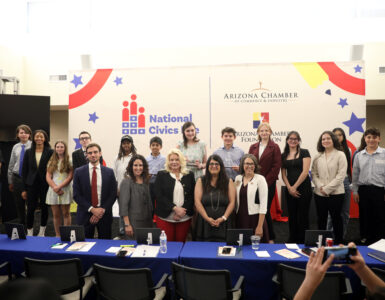The debate over public funding for K-12 education came to a head a few months ago as the Arizona Supreme Court removed a ballot initiative to nearly double the individual income tax from the November ballot. Proposition 207 was invalidated by the Arizona Supreme Court due to vague and misleading description language. But the battle at the ballot box for education funding is not limited to Arizona; it’s happening across the nation.
Hawaii
The Hawaii Surcharge on Investment Properties to Fund Public Education Amendment was advertised as an amendment to Hawaii’s state constitution to allow the legislature to levy property taxes on investment properties worth more than $1 million, but in reality, the measure was much more far-reaching.
Similar to Arizona, the Hawaii Supreme Court recently ruled the measure invalid and determined the language of the question did not make it clear enough to voters that the amendment would give the state legislature increased taxation power, and any votes already cast regarding SB 2922 will not be counted.
Opponents of SB 2922 said the language of the ballot measure was too vague for voters to understand the significance of the change and its potential ramifications. According to the Tax Foundation of Hawaii, the amendment did not properly define investment properties and contained no limitations on taxing power, essentially giving the state legislature much more power to raise revenue than was previously held.
“The intent for HSTA, the union, was that it only applied to residential investment, non-occupied, and more specifically over a million dollars in foreign-owned [property]. Our issue is that’s not what it says on the constitutional amendment,” said Sherry Menor-McNamara, president and CEO of the Chamber of Commerce Hawaii. “And so, that was our argument and we just know that if this was passed it would have been a vehicle for the legislature or a blank check for the legislature to come back each session and increase taxes.”
The Chamber of Commerce Hawaii created a coalition called the Affordable Hawaii Coalition made of developers and the real estate association, which gained support from local chambers across the state, the laborers union, retail merchants, and the restaurant association.
This was the first time the Chamber engaged in a ballot initiative.
Another concern was the addition of a surcharge could cause property owners to pass the additional cost on to renters who could be Hawaiian residents and workers. The Hawaii Constitution currently says that taxation of “real property” can only be done by the counties. Mike White, chair of the Maui County Council, wrote in The Maui News that real property taxes are the main source of income for Maui County, accounting for 40 percent of its total revenue.
Supporters said the amendment would bring necessary improvement to the state’s underfunded public education system. In all 49 other states, property taxes are already used to fund public education. According to the Hawaii State Teachers Association (HSTA), Hawaii spends the lowest percentage of both state and local revenue toward education in the nation.
Though the measure was kicked off the ballot, HSTA was still determined to find a way to help fund public education. The solution? Find common ground with all parties involved. “There was no animosity, there was no pushback or there was no combative language involved,” Menor-McNamara said. “It was truly a sincere effort to say, ‘OK let’s move forward. Let’s work together and move forward and find solutions.’”
The response to the demise of Prop 207 stands in stark contrast. Rather than looking to find an alternative, supporters of the failed initiative, are using their resources to fund a revenge campaign to block the retention of two Arizona Supreme Court justices.
Colorado
Colorado Amendment 73 is a combined initiated constitutional amendment and state statute on the November 6 ballot. The initiative would establish a tax bracket system rather than a flat tax rate, raise taxes for individuals earning more than $150,000 per year, raise the corporate income tax rate and create the Quality Public Education Fund. A 55 percent supermajority vote is required to approve the initiative.
The tax increase would not affect those earning $150,000 or less per year, keeping those individuals’ tax rate at the current 4.63 percent flat rate. For incomes of $150,001 and above, new tax rates would be between 5 and 8.25 percent. The measure would decrease property taxes levied by school districts but would not affect property taxes from other local governments; the tax rate for residential property would drop from 7.2 percent to 7 percent, and the rate for non-residential property would drop from 29 percent to 24 percent. The corporate tax rate would increase from 4.63 percent to 6 percent.
Under the Quality Public Education Fund, revenue from new taxes would be used to fund preschool through 12th-grade public education, increasing the statewide base per-pupil funding and spending for special education, preschool, English language proficiency and gifted programs, among others.
No on 73, also called “Blank Check, Blatant Deception, Vote No on 73”, leads the campaign against the amendment, joined by a number of business and policy organizations including The Independence Institute, The Taxpayer Bill of Rights (TABOR) Foundation, Denver Metro Chamber of Commerce, Colorado Bankers Association and the Colorado Farm Bureau, to name a few. Opponents argue that the new tax rates would pose a significant burden on Colorado families and businesses, giving bureaucrats a “blank check” to control revenue.
“As a Chamber, we strongly support a well-funded and effective PreK-12 system; however, this proposal raises multiple concerns for our members because it places the burden of funding education on the backs of our smallest businesses, threatening their ability to succeed, and locks that burden into our state’s constitution. This measure also doesn’t propose to deliver better results or outcomes in terms of educational achievement for Colorado. We believe it’s fair for taxpayers to expect improvements like higher graduation rates or lower remediation rates in college with significant increased funding. With almost three out of four jobs in Colorado now requiring a postsecondary credential, we think education funding should include funding for both PreK-12 and higher education to ensure families and students can work in Colorado,” said Denver Metro Chamber of Commerce President and CEO Kelly Brough.
















Add comment